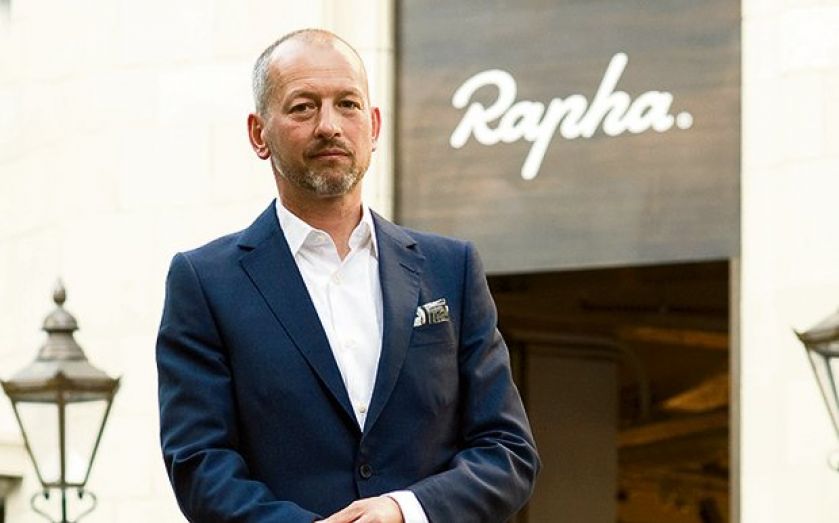Pedalling his wares

Annabel Palmer talks to Simon Mottram, founder of premium cycle clothing and accessories brand Rapha
IT’S A dilemma faced by the 1.9m professionals now cycling to work every day. Wear a suit, and you risk tears, discomfort and heat exhaustion. Wear lycra and you could be sacrificing style for comfort. But as the number of Londoners biking to work in the capital has surged in the last 10 years, so too has the popularity of cycling sportswear and lifestyle brand Rapha.
Why? According to its founder – former accountant and marketing executive Simon Mottram – there was a gap in the market for premium roadwear that urgently needed to be plugged. His timing couldn’t have been better; when Rapha was founded in 2004, cycling was a niche industry. Fast forward a decade and the Tour de France’s Grand Depart – taking place in Yorkshire – is expected to attract between 4m and 5m spectators. Rapha saw a turnover of £28.5m in 2013, has 170 staff, and is opening four stores a year globally, despite being a predominantly online retailer.
TRADITIONAL BEGINNINGS
Rapha’s origins lie in the classic story of a dissatisfied customer. A keen bike rider, “back in the days before the public knew there were cyclists out there who were normal people,” Mottram would regularly pop into his local bike shop, wallet full and ready to buy. But week after week, he would emerge disappointed. “The bikes were always beautiful, but the clothing selection was poor. And you couldn’t spend £1,000 on a bike every week.”
Much like the sport Mottram so passionately adores, getting Rapha off the ground has been a test of endurance. But three things sustained him in the early climbs. First, a career in marketing had taught him the importance of customer insight. His position as a “normal” outsider in what was a “traditional, introverted” industry gave him the perspective he needed to penetrate the market.
Secondly, the sport was a niche community of which Mottram was a member. He relied on that to spread the word, rather than splashing out on traditional paid media. And finally, unlike many entrepreneurs, he was in a strong financial position. As a freelance marketing consultant, he could spend three days a week working, and the other two researching his “obsession”. “Entrepreneurs often talk of stepping off the cliff into the unknown, but it was a sensation I never felt. I could jump when the time was right.”
LOW POINTS
But like many entrepreneurs, Mottram did struggle to secure the investment needed to turn his idea into a business. It took over 200 meetings before he raised £150,000 risk capital from private individuals – just enough to create a small capsule collection and build a website. A week prior to launch, however, Mottram had what he describes as the “worst moment” of his professional life. Having invested in the website and launch venue, he got a call from the manager at his Midlands factory, refusing to deliver the product. While the situation was swiftly resolved, late deliveries and product issues remain a constant challenge.
So, too, is brand imitation. “I try not to worry about it too much. I know how hard it is to go from selling a few jerseys and being a £200,000 company, to being a profitable business. It takes a lot of work.” A greater threat, however, is the factories cropping up internationally, where cheap knockoffs are churned out and sold to often-unsuspecting consumers. “And the more you try to close them down, the more they seem to multiply. It’s a real problem for brands.”
And it’s likely that, since Rapha won the bid to design Tour de France winners Team Sky’s kit, these copycats will only become more popular. So what was behind the decision to collaborate with Sir Bradley Wiggins’s team? As a percentage of sales, the team kit itself remains a small minority, but it has given Rapha credibility (“people often assumed we weren’t high performance”), access to the top levels of sport, and a higher calibre of staff. “The people who want to work at Rapha now wouldn’t even have considered us a few years ago.”
BRIGHT FUTURE
While Mottram accepts that the cycling market is particularly “frothy” at the moment – buoyed by Olympic and Tour victories– he thinks the fundamentals will remain strong. But it’s womenswear that presents the greatest opportunity, he tells me. With the first women’s Tour de France taking place this summer, the future could be bright for female cycling. “One of our retail partners bet me a case of wine, when we launched our first women’s range four years ago, that we’d only do it for a year. But here we are.”
Indeed, his willingness to “trust his convictions” and “go for it” has been key to Mottram’s success. “I know so many potentially budding entrepreneurs who have a good idea, have perhaps done some business modelling, had a few conversations. But it takes much more than that to get it over the line. Until you do it, it’s just talk.”
CV SIMON MOTTRAM
Company name: Rapha
Turnover: £28.5m (2013)
Founded: 2004
Number of staff: 170
Job title: Founder and chief executive
Age: 48
Born: Rotherham, South Yorkshire
Lives: London
Studied: Politics and French at the University of Sussex. Qualified ACA with PwC (London)
Drinking: Cote Rotie and Old Fashioneds
Eating: Simple, well cooked pasta
Reading: Lanterne Rouge, by Max Leonard
Favourite business book: Built to Last, by Jim Collins and Jerry Porras
Talents: Map reading and directions
First ambition: To be an architect
Motto: “Never sacrifice style for speed”
Heroes: Marco Pantani, Stevie Wonder
Awards: Fast Track 100, 2011 and 2014